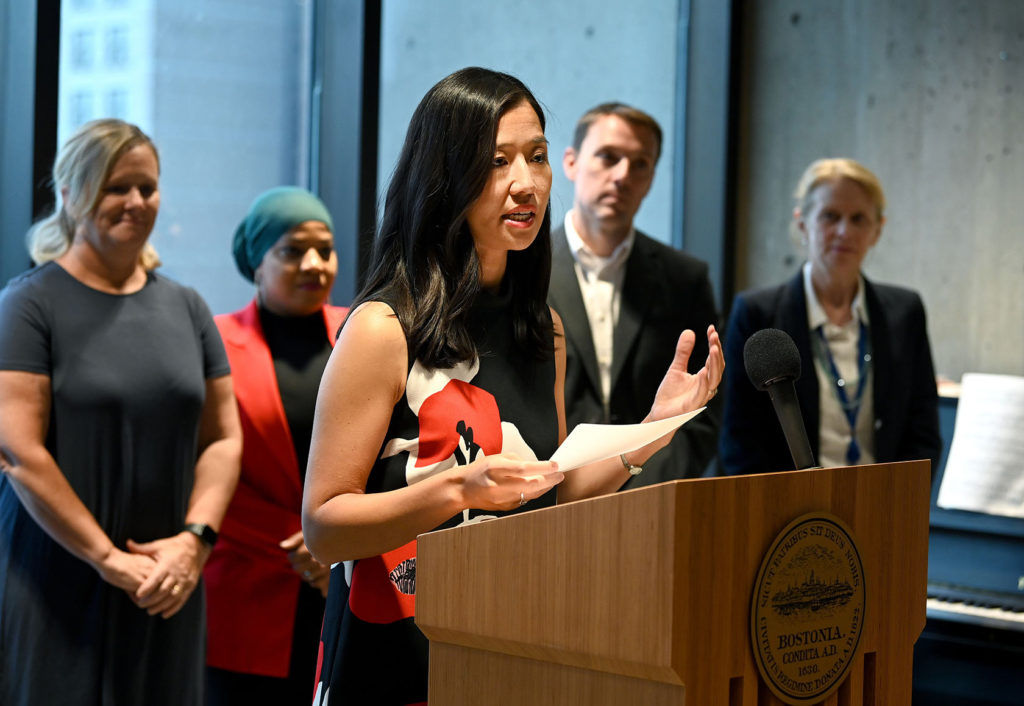Is Wu still planning to dismantle the BPDA?
Mayor has no timeline for breaking apart agency

When Michelle Wu was a contestant in last year’s five-way race for mayor, dismantling the Boston Planning and Development Agency was a key plank in her progressive platform.
Wu’s commitment echoed longstanding calls from neighborhood activists to separate the city’s planning function out of the urban renewal-era, quasi-governmental agency which is funded through the sale and leasing of publicly-owned land. In most major cities, urban planning departments are under the control of and accountable to city government.
Now, nine months into her first term, Wu’s new director of planning, Arthur Jemison, has a staff comprised entirely of BPDA employees and works out of the agency’s 9th floor office in City Hall.
Asked during a press conference last week about her pledge to abolish the BPDA, Wu acknowledged that the agency, which originally focused on urban renewal projects in the city’s core neighborhoods, is outdated, but was noncommittal on when she would move to dismantle it.
“I hope we can move things fast,” she told reporters. “We’ll see how long state processes take. We will have even more robust planning in the city of Boston by the end of the term. We will have even more supportive growth and equitable development in the city by the end of the term. And we will figure out whether or not the state legislature will pass the exact laws that you would need to send up to formalize things.”
Her response was not what Dwaign Tyndall expected. The executive director of the Roxbury-based environmental justice group Alternatives for Community and Environment noted that in 2019, after she launched her campaign for mayor, Wu released a 76-page whitepaper on abolishing the BPDA.
“We all knew the struggles and difficulty in that process,” he said. “Now that she’s in office, she’s not expending the political capital to get it done. Developers are still doing business as usual.”
‘Created to destroy’
The BPDA was created as the Boston Redevelopment Authority by the Legislature and City Council in 1957 at a time when city planners saw downtown neighborhoods as blighted. Federal law gave quasi-governmental development authorities extraordinary powers to take land for redevelopment at a time when nineteenth century neighborhoods such as the West End, the New York Streets area, Castle Square and Scollay Square were being bulldozed to make way for businesses and luxury residences under the guise of slum clearance. In Roxbury, where the Madison Park neighborhood was razed for the construction of a planned 5,000-student high school campus, Black residents referred to the agency’s urban renewal plans as “Negro removal.”
Sixty-five years later, the agency, now rebranded as the Boston Planning and Development Agency (BPDA) retains its mid 20th century quasi-governmental structure and retains its urban renewal powers. Neighborhood activists and some city councilors say that the city should have a planning department independent of the agency, which manages the community-review processes through which real estate developers obtain the rights to build large-scale projects.
“Bringing the work of planning in-house instead of in a quasi-governmental agency, would bring greater accountability,” said District 6 City Councilor Kendra Lara. “The City Council and the mayor should have say over planning.”
Former state Rep. Byron Rushing says the BRA is long past its expiration date.
“It should never have been born,” he said. “It was created to destroy neighborhoods.”
Wu, too, acknowledged the different reality in which the BPDA is currently functioning.
“We are not only in a different situation facing different challenges, but the parts of the city where we are having those conversations and using the same tools that were created in the 1960s are somewhat mismatched today,” she told reporters.
The plan
Wu’s whitepaper called for the city to remove urban renewal designations from areas of the city which are under BPDA control and obtain legislative approval for the dissolution of the agency. But Wu’s report also noted that much of the dismantling of the BPDA could be done without turning to the Legislature.
“The BPDA has authority to transfer properties in fulfilling its urban renewal responsibilities and could facilitate the transfer of assets as described above,” the report reads. “The BPDA also has power to delegate its urban renewal implementation powers to the City.”
The whitepaper also notes that state law would allow for the dissolution of the BPDA through a vote of its board and the approval of the Massachusetts secretary of state.
“‘Whenever a redevelopment authority determines that there is no further need for its existence, and that all outstanding obligations of the authority have been satisfied, it may by a majority vote of the five members submit the question of its dissolution . . . to the municipal officers,’” the report quotes, citing Massachusetts General Law 121B § 4.
Under that scenario, the Legislature would vote to confirm the decision.







